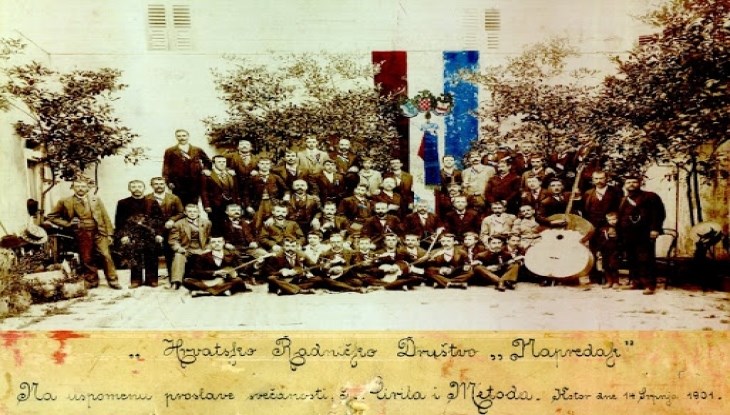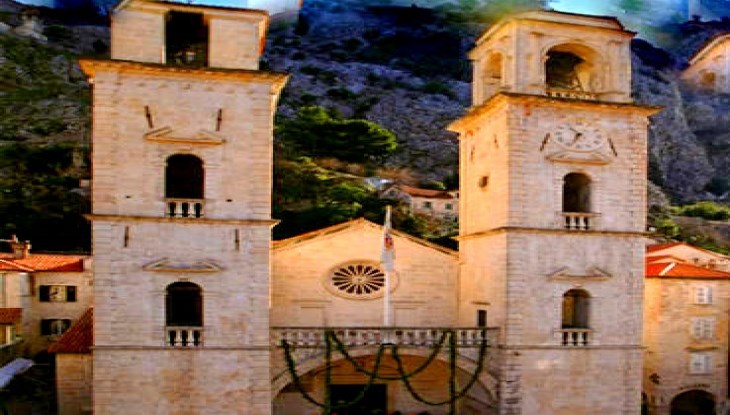Croatian minority in Montenegro
Croats in Montenegro live along the shores of the Adriatic Sea, mostly in the region of the Bay of Kotor, in towns of Tivat, Kotor, Herceg Novi, Budva, Bar and Podgorica.
Based on church data it is estimated that around 10,000 Croats live in Montenegro and according to the census of 2011 the number of Croats living in Montenegro is 6.021. Croats in Montenegro have been recognized as a national minority and according to the Constitution of Montenegro the Croatian language is officially used.
The Croatian National Council in Montenegro based in Tivat is a central institution of Croatian national minority. It represents Croatian national minority in Montenegro in the areas related to official use of language, education, information dissemination and culture. The Croatian National Council (HNV) participates in decision making process or makes decisions about the issues related to aforementioned fields and it establishes the institutions in these fields. The president of HNV is Zvonimir Deković.
The Croatian Civic Initiative (HGI) is the first political party having the Croatian name and the president of HGI Adrijan Vuksanović is a member of the Parliament of Montenegro.
In 2009 the Agreement on the Protection of the Croatian minority in the Republic of Montenegro and the Montenegrin minority in Croatia respectively was signed, which made the basis for foundation of Intergovernmental Joint Committee for the Protection of Minorities (MMO) between the Republic of Croatia and the Republic of Montenegro. The last, third session of MMO was held in Podgorica, on 27 September 2018.
Based on the Law on Relationships between the Republic of Croatia and Croats Abroad (Zakon o odnosima Republike Hrvatske s Hrvatima izvan Republike Hrvatske), the Government of the Republic of Croatia adopted the Decision on Establishing and Appointing the Members of the Council of the Government of Croatia for Croats Abroad, which held its constituting session in July, 2022, where the representative of the Croatian minority in Montenegro at the third Council convocation is Mr. Adrijan Vuksanović.
Umbrella association of Croats in Montenegro is “Dux Croatorum“. Side by side with this association there are 10 other associations bearing the Croatian name. They all have the same goal, i.e., the protection and the implementation of all rights that Croats, as an indigenous minority, are entitled to, and in accordance with international documents and democratic standards.
Since 2004 the classes of Croatian language and culture are held in Kotor and Tivat under the competence of the Ministry of Science and Education of the Republic of Croatia. Classes are taught by a teacher assigned by the Ministry of Science and Education of the Republic of Croatia at primary school premises in Tivat and Kotor. In addition, there is an initiative to integrate Croatian language classes into the education system of Montenegro.
The Croatian Civic Society of Montenegro publishes a magazine “Hrvatski glasnik" every two months whose goal is to encourage coexistence, national, cultural, spiritual and religious tolerance as well as strengthen the relations between the Republic of Croatia and Montenegro.
Croatian minority radio station “Radio Dux“has successfully worked for more than 10 years. It was founded in 2009 by the umbrella association of Croats in Montenegro “Dux Croatorum” and the Croatian National Council. Croatian radio television – Croatian radio helped with providing equipment. The radio station was launched in order to preserve Croatian identity, promote historical and cultural heritage and to provide better access to information to Croats as an indigenous minority in Montenegro.
Based on church data it is estimated that around 10,000 Croats live in Montenegro and according to the census of 2011 the number of Croats living in Montenegro is 6.021. Croats in Montenegro have been recognized as a national minority and according to the Constitution of Montenegro the Croatian language is officially used.
The Croatian National Council in Montenegro based in Tivat is a central institution of Croatian national minority. It represents Croatian national minority in Montenegro in the areas related to official use of language, education, information dissemination and culture. The Croatian National Council (HNV) participates in decision making process or makes decisions about the issues related to aforementioned fields and it establishes the institutions in these fields. The president of HNV is Zvonimir Deković.
The Croatian Civic Initiative (HGI) is the first political party having the Croatian name and the president of HGI Adrijan Vuksanović is a member of the Parliament of Montenegro.
In 2009 the Agreement on the Protection of the Croatian minority in the Republic of Montenegro and the Montenegrin minority in Croatia respectively was signed, which made the basis for foundation of Intergovernmental Joint Committee for the Protection of Minorities (MMO) between the Republic of Croatia and the Republic of Montenegro. The last, third session of MMO was held in Podgorica, on 27 September 2018.
Based on the Law on Relationships between the Republic of Croatia and Croats Abroad (Zakon o odnosima Republike Hrvatske s Hrvatima izvan Republike Hrvatske), the Government of the Republic of Croatia adopted the Decision on Establishing and Appointing the Members of the Council of the Government of Croatia for Croats Abroad, which held its constituting session in July, 2022, where the representative of the Croatian minority in Montenegro at the third Council convocation is Mr. Adrijan Vuksanović.
Umbrella association of Croats in Montenegro is “Dux Croatorum“. Side by side with this association there are 10 other associations bearing the Croatian name. They all have the same goal, i.e., the protection and the implementation of all rights that Croats, as an indigenous minority, are entitled to, and in accordance with international documents and democratic standards.
Since 2004 the classes of Croatian language and culture are held in Kotor and Tivat under the competence of the Ministry of Science and Education of the Republic of Croatia. Classes are taught by a teacher assigned by the Ministry of Science and Education of the Republic of Croatia at primary school premises in Tivat and Kotor. In addition, there is an initiative to integrate Croatian language classes into the education system of Montenegro.
The Croatian Civic Society of Montenegro publishes a magazine “Hrvatski glasnik" every two months whose goal is to encourage coexistence, national, cultural, spiritual and religious tolerance as well as strengthen the relations between the Republic of Croatia and Montenegro.
Croatian minority radio station “Radio Dux“has successfully worked for more than 10 years. It was founded in 2009 by the umbrella association of Croats in Montenegro “Dux Croatorum” and the Croatian National Council. Croatian radio television – Croatian radio helped with providing equipment. The radio station was launched in order to preserve Croatian identity, promote historical and cultural heritage and to provide better access to information to Croats as an indigenous minority in Montenegro.
Boka kotorska – „Zaljev hrvatskih svetaca“, (“Bay of Croatian Saints”) is one of the roots of Croatian culture and history. Katedrala sv.Tripuna (St Tryphon’s Cathedral), numerous churches and monuments are outstanding, and at the same time they are a proof of twelve century- long existence of Croats in this region. There are strong ties between Croats and Catholic church today. Tangible and intangible cultural heritage of Croats in Montenegro is exceptionally rich. Bokeljska mornarica (Bokelj Navy) has a special role with more than nine century- long tradition of maritime fraternity which Bokelj Croats nurture and are very proud of.




